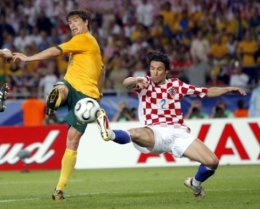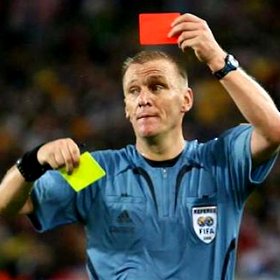
Okay, I'm obsessed with the World Cup. I'll admit it. I have been since I saw Mark Schwarzer
magnificently defend us into the cup against Uruguay last year. To me,
Schwarzer became the real hero of the Socceroos, and I was hooked.
Early this morning though, as I watched the bizarre and amazing Croatia v Australia match, my heart sank when we were informed that
Guus – another untainted hero up to this point – had decided to replace Schwarzer in the keeper position with another tall guy called
Zeljko Kalac. It was the first stupid, frustrating thing about a bizzarre, yet elating match; elating because we did get the (thoroughly glorious 2-2) draw we needed to get past Croatia to round 2 in the end. But poor Schwarzer and Kalac... I don't know which I felt most sorry for – Kalac for letting through a goal with a fumble or Schwarzer having to watch, grey-faced, from the bench.
It just seems like this entire World Cup, Australia has had to contend with a stream of seriously bad umpiring, but so far the umpires have been
very lucky that their bad decisions were counteracted by the Roos scoring another goal or – in the case of Brazil – by the opposition being ranked #1 in the world and producing a convincing enough lead to make us feel like Australia wouldn't have outdone them, had the umpiring been fair, anyway.
First it was that (fake) goal by Japan where Schwarzer was pushed over by the Japanese striker and unable to get near the ball. The Egyptian umpire,
Abd El Fatah, later admitted he was wrong, which is admirable, since Merk and Poll, the next two umpires the Roos had to contend with, are yet to make any apology or admit to any mistakes. I thought this mistake would have to be the worst mistake possible, but not so...
Next, it was
Markus Merk whose blatant favouritism towards the Brazillian team saw him award a disproportionate number of penalties in Brazil's favour.
Kewell expressed his disgust and would have been banned for his backchat to Merk, except that Merk had embarrassed FIFA by personally threatening Kewell with a ban for the Croatia match. A positive attribute I normally associate with Germans is that they care about getting things right. Since Merk didn't possess this trait, it seems there's not much left to redeem him.
Finally, this morning it was a pommie tool,
Graham Poll, who really screwed us over – not to mention Croatia. Tom Dart
puts it well in the
Times Online:
...The choice of Graham Poll as referee was surprising since he is familiar to the Australians who play in the Barclays Premiership. Mark Viduka was incandescent early on when the Englishman failed to give a penalty after the Middlesbrough striker was manhandled by Josip Simunic. Poll did point to the spot later in the half, though, when Stjepan Tomas crassly handled a cross...
The main one that riled me was the rugby tackle that Dart calls "manhandling" perpetrated by
Josip Šimunić on
Viduka. Viduka had every chance to score a goal in that moment but was prevented from kicking due to Šimunić's arms wrapped around his torso. Kalac may feel relief that Kewell scored the second goal of the match to equalise, but Poll should feel it more. Incidentally, video footage shows that Kewell's goal should have been discounted because at least one Aussie players was offside before he kicked. Bummer for Croatia, but, if not for Kalac's fumble – blame Guus – Croatia wouldn't have had the upper hand in the first place (i.e. the Roos were playing significantly better than Croatia).
Like practically everyone else who's following the cup here in Australia – which seems to be well over a quarter of nation, based on television viewing stats – I'm absolutely stoked that Australia got this far in the cup. But, more than this, I'm proud that they did it despite having to work so hard against inexcusably bad and partial umpiring.
It's truly inspiring and that's why Viduka's crediting the Roos' "fighting spirit" resonates so strongly.The Socceroos have earned it well and truly. So, FIFA, let next Tuesday's game between Italy and Australia be one where the umpire does the job properly and gives both the Roos and the Azzurri a fair go!
See also:
Categorised as: societyTechnorati Tags: Socceroos, Croatia v Australia, Zeljko Kalac, Mark Schwarzer, Harry Kewell, Mark Viduka, Josip Simunic, World Cup, FIFA, umpiring, soccer, football, Guus Hiddink
 Now we know what we should be lining the roads with to avoid the carnage of kangaroo collisions! Via ABC comes a report on a study that revealed kangaroos are repelled by dingo urine:
Now we know what we should be lining the roads with to avoid the carnage of kangaroo collisions! Via ABC comes a report on a study that revealed kangaroos are repelled by dingo urine:  Following from my
Following from my 







